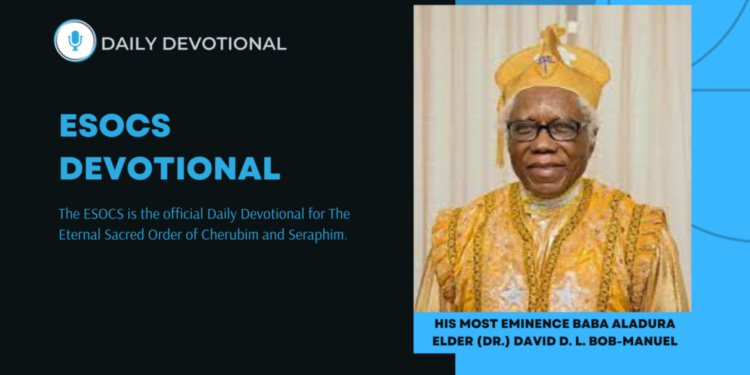ESOCS Devotional 22 April 2024 – Who is a God Like You?
MEMORY VERSE: Who is a God like unto thee, that pardoneth iniquity, and passeth by the transgression of the remnant of his heritage? He retaineth not his anger forever, because he delighteth in mercy.” Micah 7:18
TEXT: MICAH 7:7-20
But as for me, I will look to the Lord and confident in Him I will keep watch; I will wait with hope and expectancy for the God of my salvation; my God will hear me.
8 Rejoice not against me, O my enemy! When I fall, I shall arise; when I sit in darkness, the Lord shall be a light to me.
9 I will bear the indignation of the Lord because I have sinned against Him, until He pleads my cause and executes judgment for me. He will bring me forth to the light, and I shall behold His righteous deliverance.
10 Then my enemy will see it, and shame will cover her who said to me, Where is the Lord your God? My eyes will see my desire upon her; now she will be trodden down as the mire of the streets.
11 In the day that your walls are to be built [a day for building], in that day shall the boundary [of Israel] be far extended and the decree [against her] be far removed.
12 In that day they will come to you from Assyria and from the cities of Matzor [Egypt] and from Egypt even to the river [Euphrates], from sea to sea and from mountain to mountain.
13 Yet shall the earth be desolate because of those who dwell in it, for the fruit of their doings.
14 Rule and feed Your people with Your rod and scepter, the flock of Your inheritance who dwell alone in a forest in the midst of Carmel [a garden land]; they shall feed in Bashan and Gilead, as in the days of old.
15 As in the days of your coming forth from the land of Egypt, I will show them marvelous things.
16 The nations shall see [God’s deliverance] and be ashamed of all their might [which cannot be compared to His]. They shall lay their hands upon their mouths in consternation; their ears shall be deaf.
17 They shall lick the dust like a serpent; like crawling things of the earth they shall come trembling out of their strongholds and close places. They shall turn and come with fear and dread to the Lord our God and shall be afraid and stand in awe because of You [O Lord].
18 Who is a God like You, Who forgives iniquity and passes over the transgression of the remnant of His heritage? He retains not His anger forever, because He delights in mercy and loving-kindness.
19 He will again have compassion on us; He will subdue and tread underfoot our iniquities. You will cast all our sins into the depths of the sea.
20 You will show Your faithfulness and perform the sure promise to Jacob and loving-kindness and mercy to Abraham, as You have sworn to our fathers from the days of old.
Read Other ESOCS Devotional here
We need to be grateful that God is such a great forgiver. Sin affects every human (1 Jn. 1:10). Sin leads to death (Ezek. 18:4). Speaking of forgiveness, Micah asks the rhetorical question, “Who is a God like you?” The obvious answer is “No one”. There is no god like our God. When God led the Israelites through the Red Sea, Moses asked this question (Ex. 15:11). When recounting God’s wonderful works, Asaph asked this question (Ps. 77:13). Micah now asks this question in relation to God’s power. Micah’s point is that the same power God uses to work wonders and intervene in history is the same power He uses to forgive sins. Let’s examine how God’s forgiveness is incomparable.
God pardons iniquity and passes over transgressions. Pardoning iniquity carries the idea of taking away guilt. Passing over transgressions refers to covering it over, not inflicting punishment because of it. When Micah wrote, the sins of Judah and Israel were great. The people were idolatrous (1:7). Very greedy and oppressive (2:2). Hated good and loved evil (3:2). Because of these sins, God would send Israel and Judah into captivity. Yet, the message here is one of hope, God forgives sins (Colossians 2:13; 1 John 2:12).
God forgives sin for His remnant. “Remnant” refers to those who are faithful and who survive God’s judgment. The idea of “remnant” is that these are the few who are truly dedicated to God. The meaning here is that God only forgives those who are faithful. God forgives those who have entered into the new covenant (Heb. 10:16-17). If we walk in the light, Jesus’ blood cleanses us of sin (1 Jn. 1:7).
Although God is slow to anger (Ex. 34:6), God does become angry. Micah speaks much of God’s anger. God’s anger makes the mountains melt and the valleys split like wax (1:4). The Lord was devising disaster against His people (2:3). Yet, God does not retain His anger forever. Sin causes God to be angry (Rom. 1:18). God turns away from anger. When Aaron made the golden calf for the Israelites, God’s wrath burned hot against the Israelites (Ex. 32:10). Yet, Moses interceded for the people, and God turned away from His anger (Ex. 32:11-14). God turns from His anger, for He delights in mercy. “Mercy” here represents that love with which He loves, no matter what. Therefore, because God loves us, He will turn away from His anger (Ps. 30:5).
- Always remember that even when God loves and His mercies endure forever, sometimes His patience expires; and when that happens, what follows is punishment and destruction. Let us be mindful of this truth.
- Father, I will never take your love and mercies for granted, going forward.
Further Reading: Zephaniah 3:14-end; Matthew 28:16-end; 1 Peter 3:13-end
ESOCS Devotional 22 April 2024















